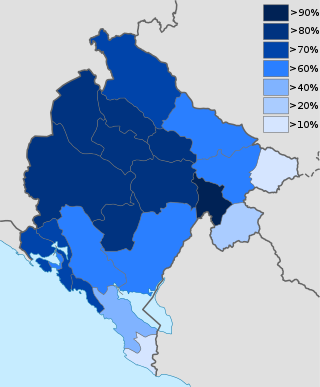Montenegro is a country on the Adriatic coast of the Mediterranean Sea.
Montenegro or Monte Negro, meaning "black mountain" in many Romance languages, may also refer to:

Montenegro is a country in Southeastern Europe, situated on the Balkan Peninsula. Its 25 municipalities have a total population of 633,158 people in an area of 13,812 km². It is bordered by Bosnia and Herzegovina to the northwest, Serbia to the northeast, Kosovo to the east, Albania to the southeast, Croatia to the west, and has a coastline along the Adriatic Sea to the southwest. The capital and largest city is Podgorica, while Cetinje is the Old Royal Capital and cultural centre of Montenegro.

The State Union of Serbia and Montenegro or simply Serbia and Montenegro, known until 2003 as the Federal Republic of Yugoslavia, FR Yugoslavia (FRY) or simply Yugoslavia, was a country in Southeast Europe located in the Balkans that existed from 1992 to 2006, following the breakup of the Socialist Federal Republic of Yugoslavia. The country bordered Hungary to the north, Romania to the northeast, Bulgaria to the southeast, North Macedonia to the south, Croatia and Bosnia and Herzegovina to the west, and Albania to the southwest. The state was founded on 27 April 1992 as a federation comprising the Republic of Serbia and the Republic of Montenegro. In February 2003, it was transformed from a federal republic to a political union until Montenegro seceded from the union in June 2006, leading to the full independence of both Serbia and Montenegro.
The early written records of the history of Montenegro begin with Illyria and its various kingdoms until the Roman Republic incorporated the region into the province of Illyricum after the Illyro-Roman Wars.
Yugoslav or Yugoslavian may refer to:
Serbian republic or Serb republic may refer to:
Onamo 'namo! is a patriotic song written by Prince Nicholas of Montenegro and first published in the Novi Sad-based Serbian-language literary journal Danica in 1867. Its melody can be attributed either to the Slovene composer Davorin Jenko or the Czech chaplain František Wimmer, the conductor of the Royal Montenegrin Army's military band.

The 1992 Montenegrin independence referendum was the first referendum regarding Montenegrin independence, held on 1 March 1992 in SR Montenegro, a constituent republic of the Socialist Federal Republic of Yugoslavia.

The prime minister of Yugoslavia was the head of government of the Yugoslav state, from the creation of the Kingdom of Serbs, Croats and Slovenes in 1918 until the breakup of the Socialist Federal Republic of Yugoslavia in 1992.
Serbia is a southeastern European country.

The Republic of Serbia was a constituent state of the Federal Republic of Yugoslavia between 1992 and 2003 and the State Union of Serbia and Montenegro from 2003 to 2006. With Montenegro's secession from the union with Serbia in June 2006, both became sovereign states in their own right for the first time in nearly 88 years.

The Republic of Montenegro was a constituent federated state of the Federal Republic of Yugoslavia and then Serbia and Montenegro between 1992 and 2006. The declaration of independence of Montenegro in 2006 ended the ex-Yugoslav state. After the collapse of the Socialist Federal Republic of Yugoslavia (SFRY), the remaining republics of Montenegro and Serbia agreed to the formation of the Federal Republic of Yugoslavia (FRY) which officially abandoned communism and nominally endorsed democratic institutions. Montenegro was a constituent republic of the FRY and its successor state until June 2006 when Montenegro declared independence from Serbia and Montenegro following the 2006 Montenegrin independence referendum.

The flag of Serbia and Montenegro was originally adopted on 27 April 1992 as the flag of the Federal Republic of Yugoslavia and was used as such from 1992 to 2006. After the country was renamed to the State Union of Serbia and Montenegro in February 2003 it remained in use as the national flag until the country's dissolution in June 2006.
Yugoslav Army, Army of Yugoslavia, or Military of Yugoslavia may refer to:

Montenegrin–Serbian relations are foreign relations between Montenegro and Serbia. From 1918 until 2006, the two states were united under the Kingdom of Yugoslavia, the Socialist Federal Republic of Yugoslavia, and Serbia and Montenegro. Since 2006, there have been sporadic instances of debate on Montenegro's legitimacy as a separate state as well as much more prominent controversial debate on the Montenegrin ethnic identity. Despite this, the two countries have maintained mostly friendly geopolitical and economic relations.

The emblem of Yugoslavia featured six torches, surrounded by wheat with a red star at its top, and burning together in one flame; this represented the brotherhood and unity of the six federal republics forming Yugoslavia: Bosnia and Herzegovina, Croatia, Macedonia, Montenegro, Serbia and Slovenia. The date imprinted was 29 November 1943, the day the Anti-Fascist Council for the National Liberation of Yugoslavia (AVNOJ) met in Jajce on its second meeting and formed the basis for post-war organisation of the country, establishing a federal republic. This day was celebrated as Republic Day after the establishment of the republic. The emblem of Yugoslavia, along with those of its constituent republics, are an example of socialist heraldry.

Elections were held on municipal, provincial, republican and federal levels in Yugoslavia from its foundation in 1918 throughout its breakup in 1992.
The Olympic Committee of Serbia and Montenegro was the non-profit organization representing athletes from Serbia and Montenegro in the International Olympic Committee. It was founded in 1992 when the olympic committee of newly formed Federal Republic of Yugoslavia kept the name, the Yugoslav Olympic Committee, that of the committee of the previous country, Socialist Federative Republic of Yugoslavia. In 2003 country of FR Yugoslavia changed the name to Serbia and Montenegro which was followed by the name change of its olympic committee, renaming it to Olympic Committee of Serbia and Montenegro.
Demographics of Yugoslavia may refer to: